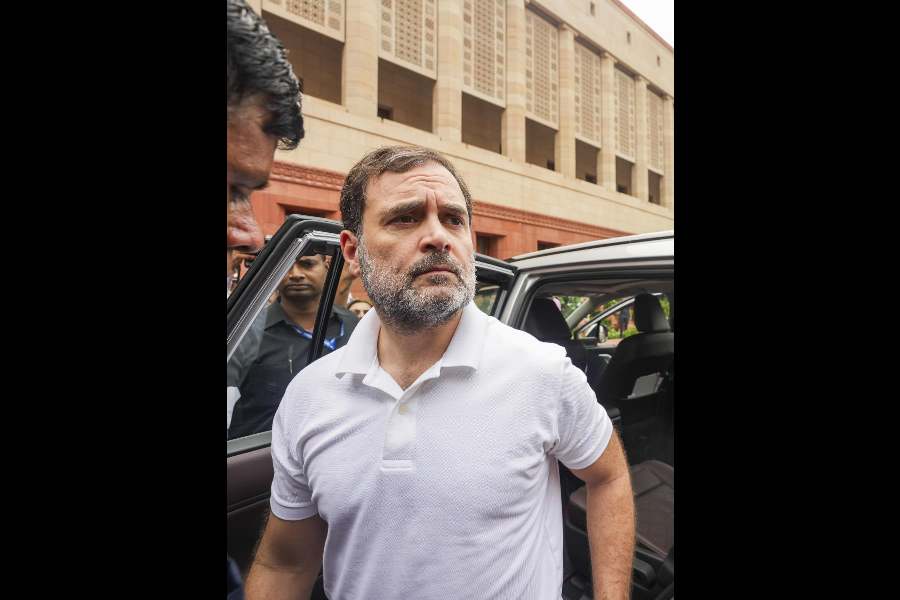The Editors Guild of India has urged Rahul Gandhi, the leader of the Opposition in the Lok Sabha, to take up in Parliament its concerns over the “legislative measures” taken over the last few years “to control (the) media”.
In its letter to Rahul, the guild listed the Digital Personal Data Protection Act, Press and Registration of Periodicals Act, Broadcasting Services Regulation Bill and amendments to the Information Technology rules and explained why it opposed them. All of them were notified or introduced last year.
“Even though some of them have been enacted in the Parliament, we are highlighting these concerns with an urgent request for driving renewed parliamentary debate and stakeholder consultation on these critical issues affecting press freedom, as well as to safeguard press freedom in any new legislative measure that will have a potential to control media,” the Guild wrote.
“We believe that a free and independent press is vital for the health of our democracy, and it is imperative that these legislative measures are revisited to safeguard these fundamental principles,” the Guild added.
The guild listed its detailed objections to each legislation.
Digital Personal Data Protection Act
- Lack of exemptions for journalistic activities: The Act does not provide specific exemptions for processing personal data for journalistic purposes, contrary to previous iterations and international norms. This poses a severe impediment to basic journalistic functions such as research, investigation, and publishing
- Consent requirements: The mandatory consent requirement for data processing allows individuals to refuse consent, thereby obstructing journalistic inquiries. Obtaining consent in many scenarios, especially in investigative journalism, is often impractical
- Onerous obligations: Provisions like purpose specification, consent withdrawal, and data erasure are impractical for journalistic work
- Government powers: The Act grants the government broad powers to exempt its agencies from its provisions and to demand information from data fiduciaries, potentially compromising source confidentiality
- Impact on RTI: The Act could weaken the Right to Information Act by expanding the grounds for rejecting RTI applications
- Surveillance concerns: The Act lacks necessary surveillance reforms and creates a framework enabling the surveillance of citizens, including journalists
- Censorship powers: The Act allows the government to censor content on the vague ground of “interest of the general public”.
Press and Registration of Periodicals Act
- Expanded regulatory powers: Allows delegation of the press registrar’s powers to other agencies, potentially including law enforcement
- Restrictions on publishing: Provisions to deny or cancel the registration of those convicted of “unlawful activity” or acts against state security could be misused against critics, especially since these laws have been used unjustifiably against journalists in the recent past
- Intrusive authority: Grants powers to the press registrar to enter press premises, inspect records, and question staff
- Ambiguous rule-making: Grants broad powers to the central government to frame rules for news publishing, raising concerns about arbitrary regulations
Broadcasting Services Regulation Bill
- Overbearing regulatory structure: The creation of content evaluation committees could lead to government control over content. The establishment of a Broadcast Advisory Council headed by a bureaucrat, with powers to monitor and block content, raises concerns about potential censorship
- Vague grounds for content restriction: The Bill allows the government to regulate or prohibit transmissions on ambiguous grounds
- Excessive rule-making powers: Provisions allow extensive delegation of rulemaking, creating uncertainty
- Intrusive powers: Authorises inspection, interception, monitoring, and seizure of broadcasting equipment
- Censorship concerns: Grants powers to order content deletion or modification and to take channels off the air.
On the IT Rules amendments, the guild said they gave the “government the power to constitute a ‘fact-checking unit’ with sweeping authority to determine what is ‘fake or false or misleading’ regarding any business of the central government and instruct intermediaries not to host such content. This absolute power lacked a governing mechanism for oversight, judicial review, or adherence to Supreme Court guidelines on content blocking, effectively leading to censorship”.
The guild said it had challenged this amendment in Bombay High Court, and the fact-checking unit had been stayed by the Supreme Court.











